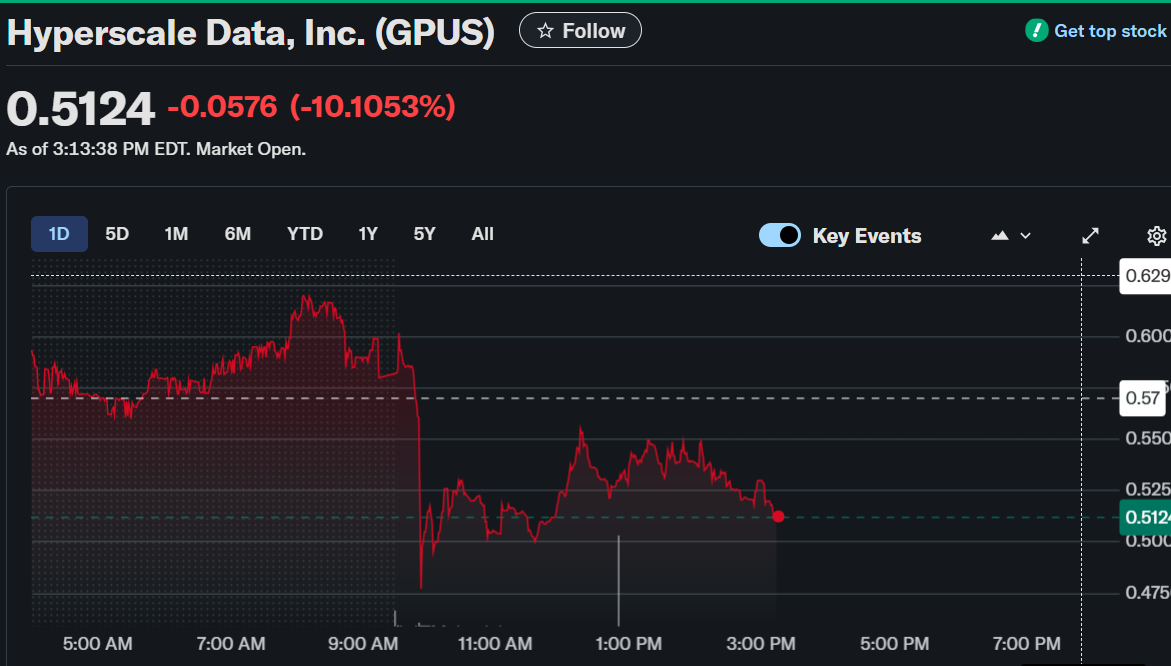TLDR
- Hyperscale Data trims $30M debt, eyes 70MW AI-Bitcoin campus expansion.
- GPUS cuts $30M debt, strengthens balance sheet amid market volatility.
- Hyperscale Data slashes debt, boosts Michigan AI and crypto operations.
- GPUS stock dips after $30M debt cut, but growth plans stay on track.
- Hyperscale Data refines capital, targets 70MW AI-Bitcoin power upgrade.
Hyperscale Data, Inc. (GPUS) shares fell sharply on Wednesday, declining approximately 10.1% intraday from around $0.57.

The decline followed the company’s announcement of a $30 million reduction in non-affiliated consolidated debt. While the update signaled improved financial flexibility, the market responded with notable short-term selling pressure.
The stock faced heightened volatility during the trading session. Hyperscale Data has focused its recent efforts on strengthening its financial position and scaling up its infrastructure. The company continues to align its business around artificial intelligence and Bitcoin mining at its Michigan data center campus.
$30 Million Debt Reduction Strengthens Capital Structure
Hyperscale Data announced that it has reduced its outstanding non-affiliated debt by approximately $30 million year-to-date through repayments and debt conversions. This move has lowered the company’s leverage ratio and strengthened its liquidity position to support upcoming growth efforts. The company emphasized that the improved capital structure enables access to better financing terms.
Management framed the reduction as a disciplined execution strategy aimed at long-term capital efficiency. The company expects that the restructured debt profile will allow further investments in infrastructure and operational technology. This also positions the business to be more responsive to future funding requirements.
With a leaner balance sheet, Hyperscale Data aims to support its broader growth agenda without relying heavily on external capital. The leadership plans to allocate available resources toward scaling its data center footprint. It views this financial transition as crucial for building a resilient platform.
Michigan AI and Bitcoin Campus Targets 70MW by 2027
Hyperscale Data continues expanding its flagship Michigan data center, operated through its wholly owned subsidiary, Alliance Cloud Services, LLC. The 617,000-square-foot facility supports dual operations for AI compute workloads and Bitcoin mining. The company aims to increase its power capacity from 30 megawatts to 70 megawatts by Q2 2027.
The company is constructing new natural gas infrastructure to enable on-site energy generation. Subject to regulatory clearance, utility partnerships, and capital availability, total power capacity could eventually grow to 340 megawatts. This phased expansion will enable the company to meet higher power demands for both compute-intensive and cryptocurrency operations.
Earlier this week, the company placed an order for 1,000 Bitmain Antminer S21+ units. The order is part of a broader upgrade program to replace older mining hardware with energy-efficient, high-performance machines. The new models are expected to double hash rate per unit of energy, enhancing mining efficiency.
Bitcoin Holdings and Treasury Growth Strategy
Hyperscale Data maintains all mined Bitcoin on its balance sheet under a long-term digital asset treasury strategy. The company also intends to grow its holdings through scheduled open-market purchases. This is part of a broader goal to build a $100 million Bitcoin treasury over time.
This approach reinforces its position in the digital asset economy while offering potential upside in crypto markets. Management continues to treat Bitcoin as a strategic reserve asset rather than a short-term gain tool. This treasury position supports the company’s hybrid infrastructure and crypto strategy.
By aligning its financial, operational and asset management strategies, Hyperscale Data remains focused on long-term stability. Despite market volatility, the company is advancing on multiple fronts to achieve structured growth. The recent dip in share price reflects market dynamics but not necessarily long-term fundamentals.








